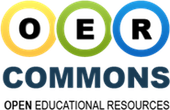User-Generated Content in Education/OER Commons
OER Commons
[edit | edit source]
"Research has shown that access to high quality, adaptable resources provides the flexibility needed for educators to develop innovative, localized content as well as pedagogical practices that are more collaborative and peer-based" (McLaughlin, 2011). [1]
OER fulfills this need. As the physical place of education has evolved, moving from brick and mortar buildings to an access anywhere online delivery, so has the concept of content. Once the stronghold of publishing giants, now information is available online, for free.
"There simply is not enough higher education," says John DeGoioa, the president of Georgetown University, "and we will never be able to close the gap through the kinds of infrastructure that have defined our past. Globalization demands that we "leapfrog" to the creative development of new infrastructure and the creative use of new technologies."[2]
That is where OER Commons comes in, providing free resources for all levels of education. The ability for all people to be active learners throughout their lives is now a possibility.
OER Commons
[edit | edit source]Open Educational Resources
OER Commons is a project of ISKME (Institute for the Study of Knowledge Management in Education) http://www.iskme.org.
This book is an overview of OER Commons which provides free online educational resources. The resources range from K-12 to college level courses. The information is searchable by grade level and by subject level.
Searching
[edit | edit source]OER Commons is searchable by subject level, grade level and conditions of use.
Subject level choices:
| Arts | Business |
| Humanities | Mathematics and Statistics |
| Science and Technology | Social Science |
Grade level choices
| Primary | Secondary | Post-Secondary |
Conditions of use
| No strings attached | Remix and share |
| Share only | Read the fine print |
Sharing
[edit | edit source]OER Commons offers mutual sharing: the ability to add sites to the OER collection as well as the ability to use a variety of sharing tools such as Diigo.
You can drag this button to your favorites bar. If you want to add an OER resource on the web, you can click that bookmark link to submit.
There are a large number of places (over 233 at this point) to download and share the information found on OER, such as
Twitter provides another avenue to access OER Commons.
Organizing
[edit | edit source]Once you create an account in OER Commons, the ability to organize your information becomes available. Folders for published items, submitted items, and draft items are the defaults. You have the ability to create your own folders as well. Your profile shows your contributions to the resource.
OER Commons provides resources organized for easy access. For example, the GREEN resource section is devoted to environmental education.
Other recommended resources are highlighted, such as Common Core Reference Collection, General Ed and Pre-College Courses, Open Textbooks, Career and Technical Educations, Classroom Management, and Science as Inquiry.
OER also offers a section that is organized by the content providers, allowing users to go directly to the type of information they seek quickly and easily.
Contact Info
[edit | edit source]For more information about this book, send an email to kirsten.zelenky@live.wilkes.edu.
Discussion Page
[edit | edit source]External Links
[edit | edit source]- http://www.iskme.org/ for information about the Institute for the Study of Knowledge Management in Education.
- http://www.oercommons.org/ for information about OER Commons
- http://cnx.org/content/col10468/latest/ for a how-to guide to using OER
- http://www.collegeopentextbooks.org/blog/uncategorized/oer-commons-an-education-ecosystem-using-knowledge-sharing/
References
[edit | edit source]- ↑ McLaughlin, L. (2011, June 23). Hats Off to California! (Part 1) – OER Commons: An Education Ecosystem Using Knowledge Sharing | College Open Textbooks BLOG. College Open Textbooks. Retrieved June 2, 2012, from http://www.collegeopentextbooks.org/blog/uncategorized/oer-commons-an-education-ecosystem-using-knowledge-sharing/
- ↑ DeGioia, J. (2011, May). The Impact of Globalization and the Future University (EDUCAUSE Review) | EDUCAUSE. EDUCAUSE Review. Retrieved June 2, 2012, from http://www.educause.edu/EDUCAUSE+Review/EDUCAUSEReviewMagazineVolume46/TheImpactofGlobalizationandthe/228660
- ↑ Atkins, D., Brown, J. S., & Hammond, A. (2007, February). A Review of the Open Educational Resources (OER) Movement: Achievements, Challenges, and New Opportunities. Retrieved from www.hewlett.org/uploads/files/ReviewoftheOERMovement.pdf





